Nemoria rubrifrontaria, the red-fronted emerald, is a species of moth in the family Geometridae, in the superfamily Geometroidea. The species was described by Alpheus Spring Packard in 1873. It is found in North America.
Tarache terminimaculata, the curve-lined bird-dropping moth, is a species of moth in the family Noctuidae. The species was described by Augustus Radcliffe Grote in 1873. It is found in North America.

Helotropha reniformis, the reniform celaena, is a species of moth in the family Noctuidae. The species was described by Augustus Radcliffe Grote in 1874. It is found in North America.
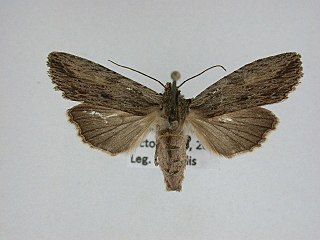
Lithophane signosa, the signate pinion or sycamore pinion moth, is a species of moth in the family Noctuidae. The species was described by Francis Walker in 1857. It is found in North America.
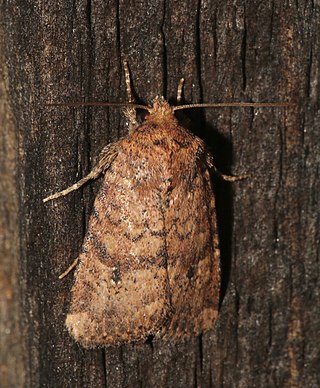
Homorthodes furfurata, the northern scurfy Quaker moth or scurfy Quaker moth, is a species of moth in the family Noctuidae . It was described by Augustus Radcliffe Grote in 1874 and is found in forest habitats in North America. Its range extends across the continent, to south-eastern Canada, Massachusetts, New York, and Mississippi. In the west it ranges south to California, Arizona, New Mexico and Texas.
Parabagrotis cupidissima is a species of moth in the family Noctuidae. It was described by Augustus Radcliffe Grote in 1875 and is found in North America, where it ranges from southern Vancouver Island, along the Pacific Coast states, to southern California. The habitat consists of grasslands and oak woodlands.
Sphingicampa bisecta, the bisected honey locust moth, is a species of moth in the family Saturniidae. The species was described by Joseph Albert Lintner in 1879. It is found in North America.
Pero radiosaria is a species of moth in the family Geometridae. It was described by George Duryea Hulst in 1886 and is found in North America, where it has been recorded from southern California to Texas.

Phaeoura perfidaria is a species of moth in the family Geometridae. It was described by William Barnes and James Halliday McDunnough in 1917 and is found in North America, where it has been recorded from Arizona, California, Colorado and New Mexico.
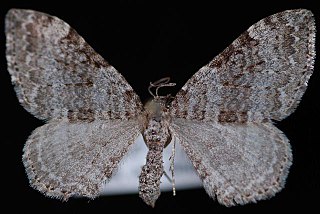
Xanthorhoe macdunnoughi is a species of moth in the family Geometridae. It was first described by Louis W. Swett in 1918 and is found in North America, where it has been recorded from open wooded areas in western North America, ranging east to western Alberta and south to California.
Annaphila arvalis is a species of moth in the family Noctuidae. It was described by Henry Edwards in 1875 and is found in North America, where it has been recorded from foothill canyons and riparian habitats in south-eastern British Columbia, eastern Washington, north-central Oregon, south to southern California.
Lacinipolia incurva is a species of moth in the family Noctuidae. It was described by John B. Smith in 1888 and is found in North America, where it has been recorded from California, Arizona, New Mexico, Texas, Utah and Colorado.
Parabagrotis insularis is a species of moth in the family Noctuidae. It is found in North America, where it has been recorded from southern Vancouver Island, along the Pacific Coast through California to near the border with Mexico. The species was described by Augustus Radcliffe Grote in 1876.
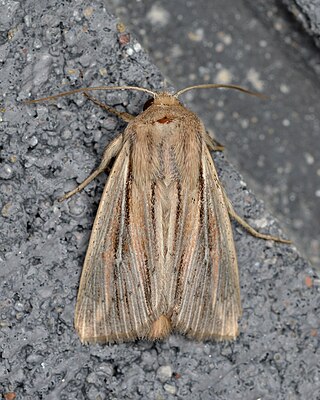
Leucania commoides, the comma wainscot or two-lined wainscot moth, is a species of cutworm or dart moth in the family Noctuidae. It was described by Achille Guenée in 1852 and is found in North America.

Meropleon ambifusca, or Newman's brocade, is a species of cutworm or dart moth in the family Noctuidae. It was described by Newman in 1948 and is found in North America.
Lobocleta granitaria is a species of geometrid moth in the family Geometridae. It was described by Alpheus Spring Packard in 1871 and is found in North America.
Hyperaeschra tortuosa is a species of prominent moth in the family Notodontidae. It was described by J. G. O. Tepper in 1881 and is found in North America.
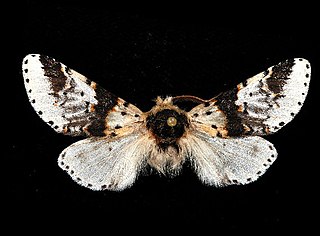
Furcula scolopendrina, the zigzag furcula moth or poplar kitten moth, is a species of prominent moth in the family Notodontidae. It was described by Jean Baptiste Boisduval in 1869 and is found in North America.
Bleptina minimalis, the small owlet moth, is a species of litter moth in the family Erebidae. It was first described by William Barnes and James Halliday McDunnough in 1812 and it is found in North America.
Bleptina flaviguttalis is a species of litter moth in the family Erebidae first described by William Barnes and James Halliday McDunnough in 1912. It is found in North America.








